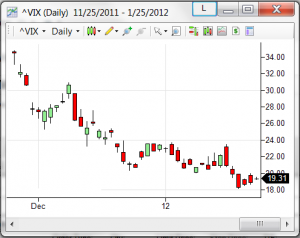I’ve previous written about auction markets and the order book and order types. Now I want to dig in at a very fine grained level and look at how the exchange matcher decides which orders to match together. This may seem like a painfully detailed topic, but it turns out to have a fairly major impact on the profitability of short term traders. Continue reading
Author Archives: W
No More Forum
I’ve decided to take down the forum. The spam to ham ratio was so bad as to be unusable. If there’s interest in a forum in the future I may consider bringing it back with better software.
I’ve had comments turned on in the blog for a while – hopefully that can serve as a useful substitute.
The Difficulties of Prediction and a Trading Koan
“I possess a quality unquantifiable by its very nature.”
“And what exactly is that, Peter?”
“Perversity.”
Peter Riviera & Molly, Neuromancer
Prediction is a funny thing. You’ll encounter lots of traders who swear up and down that what they do is not predicting the market. This, of course, is nonsense. When you take a position in the market you’re predicting that price will move in the direction of your position and thus you’ll be able to exit your position at a profit. It’s as simple as that. Prediction is the heart of trading So why do many traders, even some successful ones, deny they engage in prediction at all? Continue reading
Cool Tool
I thought people might be interested to know that Wolfram Alpha has several useful financial/economic calculators for bonds, options, interest rates, time value & historical money etc on their website. While lots of websites have calculators, it’s nice to have that functionality combined withe Alpha’s very good general math support.
Just a cool little something I stumbled into. I’ve got another big post in the works that should go up today or tomorrow.
Adjusting to Market Volatility
 If you pay attention to the financial press, you’ve probably heard the markets described as “volatile” at one point or another. In this context, volatility is not merely descriptive. It has a specific mathematical meaning which can help you make better trading (or for that matter, investing) decisions. In order to succeed as a trader you need to have a strong working understanding of volatility and its implications. Continue reading
If you pay attention to the financial press, you’ve probably heard the markets described as “volatile” at one point or another. In this context, volatility is not merely descriptive. It has a specific mathematical meaning which can help you make better trading (or for that matter, investing) decisions. In order to succeed as a trader you need to have a strong working understanding of volatility and its implications. Continue reading
The Market Takes The Stairs Up And The Elevator Down
Here’s a tidbit to think about: broad market reactions are not symmetrical. The market doesn’t move down the same way it moves up. Downward moves are generally much larger, faster, and shorter in duration. Upwards moves are slower and more sustained. Continue reading
Additive vs. Multiplicative Thinking About Money
If you think way back to grade school, you may remember that you studied addition and subtraction one year, and then a grade or two later studied multiplication and division. Each pair of arithmetic operators intrinsically go together – they’re opposites of each other (algebraists would say inverses). What I want to explore today is that each pair of arithmetic operators carries with it a means of thinking about numbers, and thus by extension thinking about money. These two means of thinking are both useful but they’re surprisingly distinct, and people frequently make the mistake of applying the wrong type of thinking in a given circumstance. My whole premise here may seem irredeemably nerdy, and it is. But bear with me anyways – I reckon there’s real insight to be had. Continue reading
Guest Post on Las Vegas Tips at Budgeting The Fun Stuff
I’ve got a guest post up over a Budgeting the Fun Stuff on tips for your Las Vegas trip. Enjoy!
Off-Road Finance also appeared in the following carnivals this week:
- Canadian Finance Carnival #71
- Totally Money Blog Carnival #50
- Carnival of Wealth
- Carnival Of Financial Camaraderie #16
Thanks everyone!
Leaving The Middle Class
This is my first new year as part of the financial blogsphere, and the year-end income and balance sheet share-athon took me a little by surprise. Not that I’m opposed to people sharing information about their finances. In “real life” it can cause social friction, but I see little harm in it on the internet – any people you offend will disappear silently into the night. I just didn’t expect it. I do think such disclosure is overall a good thing – it’s entertaining from a voyeuristic perspective, and it’s educational. Enter the obvious question: am I going to share my income? Continue reading